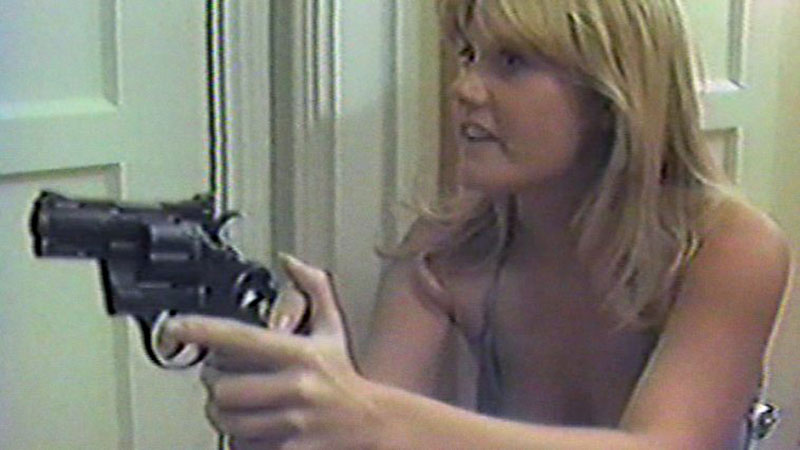Teenage Time Bomb
Can you handle the suburban hellscape of Blonde Death?
By Zack Carlson, Fri., Aug. 18, 2017
Pizza. Solo dance parties. Humping.
These are the building blocks of existence, according to teenage Southern Baptist Tammy. Her uptight parents have an opposing stance on the subject, but find it impossible to control Tammy's rampaging desires following the family's relocation from Mississippi to the L.A. suburbs.
Her dopey dad continuously throws his hands in the air, while her fundamentalist banshee stepmom declares a holy war against their hellspawn's transgressions. Soon, their home is invaded by a hunky armed intruder named Link. He ties Tammy up, berates her, and reveals that he's just escaped from prison, where he was held for various auto thefts and murders. Within minutes, they are in love.
Romance blooms as the pair spend their days intertwining loins and exterminating innocents. But the endless rumpus falters in the looming shadows of one-eyed homicidal lesbians and former prison boyfriends, and everything soon spirals into apocalyptic, suicidal oblivion. Their lawless descent finally explodes in a scene that was illegally shot inside the guarded gates of the actual Magic Kingdom™.
This last bit of daredevilry is exactly what makes Blonde Death a major triumph in the Eighties low-budget universe. True fearlessness is nearly nonexistent in movies of any budget, and the film's performances, dialogue, and pacing match this inspiring recklessness at every turn.
Characters offend with razor wit and expire at lightning speed, drawing possible dismissive comparisons to early John Waters, though Blonde Death is every bit as strong as Waters' best. All the more impressive is the fact that the entire production was completed for under $2,000.
Most of the credit goes to writer/director/producer "James Dillinger," who was actually playwright, novelist, and self-proclaimed anarchist James Robert Baker. Described as "the world's angriest gay man" by the press, Baker spent his life at war with America's concepts of family, religion, politics, and entertainment.
He held a particularly jagged chip on his shoulder against the Disney empire, as evidenced by his only other directorial effort, 1978's Mouse Klub Konfidential, about a fresh-faced Mouseketeer who becomes a gay bondage pornographer. In addition to its obvious legal risks, the feature was wrongly accused of advocating fascism, and reportedly caused Michael Medved to abandon his dreams of filmmaking to instead become a movie critic.
Baker spent the next two decades churning out equally incendiary, monocle-spinning novels and plays, and was eventually shunned by publishers and the live theatre community alike for his tireless negative rage. At the age of 51, he chose to end his life via carbon monoxide poisoning in his garage (exactly how two characters perish in Blonde Death).
His suicide was his supreme venomous bird-flip to the world, and though I wish he could be alive to read this overdue praise of his work, the brilliant and overlooked James Robert Baker – to his credit – wouldn't give a shit.
Blonde Death (1983) @AFS Cinema, Friday & Saturday, 10pm; Sunday, 8pm.








